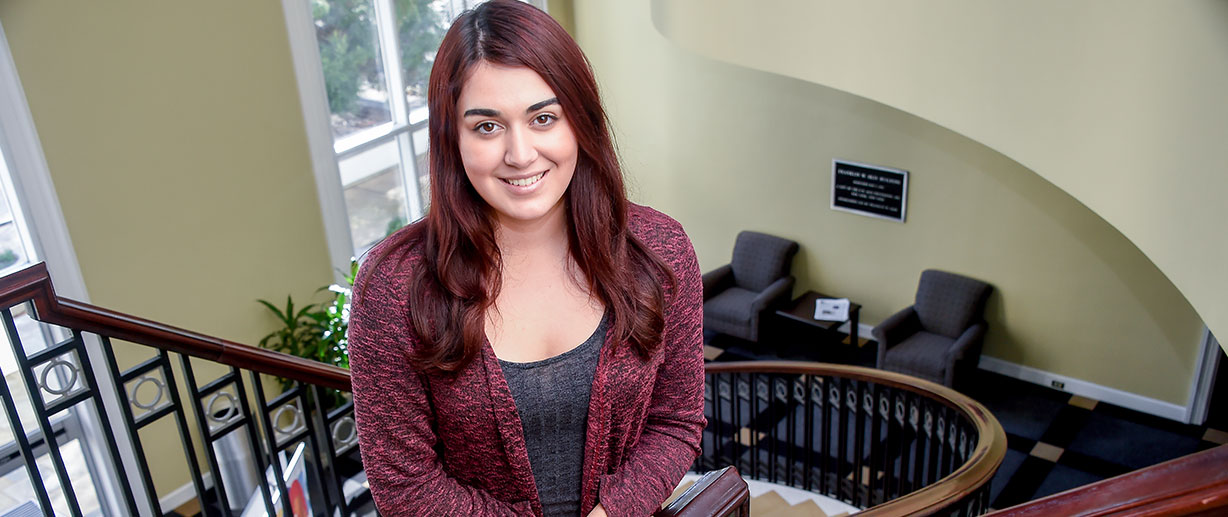SPARTANBURG, S.C. – Hana Barazi, a junior sociology and anthropology major at Wofford College from Hendersonville, N.C., spent much of the past summer on the coast of Galveston Island, Texas, researching affordable housing and issues of gentrification there following the impact of Hurricane Ike in September 2008.
Barazi was one of 13 student members of the Ocean and Coastal Research Experiences for Undergraduates (OCEANUS), spending 10 weeks researching and working with members of the Galveston Island community.
OCEANUS, a Texas A&M University-based international program focused on the sustainability of coastal systems, provides talented and ambitious undergraduates with an immersive research experience that allows students to work on their research and metacognitive skills. Funded by the National Science Foundation, the program also is meant to foster interest and retention in STEM graduate programs and careers.
Barazi, however, filled a niche that the program had been seeking – a non-STEM student who could work directly with the Galveston community for a social science research project. “My interests in social work, service and community development were unique,” she says, adding that her extensive experience with community projects helped her get onto the research team and aided in her work with the project. That experience includes leading two student organizations at Wofford, including Amnesty International and Wofford Companions, which brings special needs adults to campus for events and activities. She also has been working on developing financial literacy workshops for the Spartanburg community, which now is part of a community development class she’s taking. Activities in Dr. Alysa Handelman’s on cultural and linguistic anthropology also put her out into the community, visiting the Spartanburg Housing Authority and other organizations.
The OCEANUS team focused on the emergent affordable housing crisis and gentrification on Galveston Island, where 80 percent of the city’s homes and much of its critical infrastructure were damaged by Ike’s high winds and devastating flooding. The 10- to 15-foot waves that laid waste to single-family and vacation homes also damaged the island’s four public housing developments – located in low-income neighborhoods with high percentages of people of color. Four months after the storm, the Galveston Housing Authority decided to demolish all four developments – 569 housing units – due to extensive damage to the buildings. U.S. Census estimates show nearly 7,000 people have not returned to the city since the hurricane.
Headed by Dr. Jenna Lamphere, a humanities professor at Texas A&M University in Galveston, the team researched the area and studied relevant articles and literature on topics such as gentrification by disaster, historical preservation and short-term rentals. Barazi also conducted interviews with members of the community and completed fieldwork.
“Galveston being a coastal community must function both as a residential community and tourist destination,” Barazi says. “I looked at the complexities and tensions this dual identity can entail, specifically in relation to housing and low-income populations. I focused on and analyzed how natural disasters – like hurricanes – short-term rentals and historic preservation could be contributors to or drivers of gentrification.” She also looked at social factors such as physical and mental abilities, race and age that can affect the residents’ housing situation in this coastal community.
The students on the team also participated in professional workshops, research field trips and scientific discussions to expand their research skills. Their research culminated in a video presentation and an academic poster, which were presented at two research symposiums at the conclusion of the program.
“The work was transformative for me personally and professionally,” Barazi says. “It was such a privilege to work within another community, and I grew passionate about the people there and the struggles they are facing and work they are doing.”
The experience also fed her passion for becoming an occupational therapist and continuing her involvement in the community. As a student leader of Wofford Amnesty International, Wofford Companions and the Anthropology-Sociology Major Club, she plans to apply her findings to these on-campus service clubs. She also has plans to help develop a local financial literacy program.
Barazi’s research continues with Lamphere, and they intend to produce an academic article detailing the housing crisis on Galveston Island
